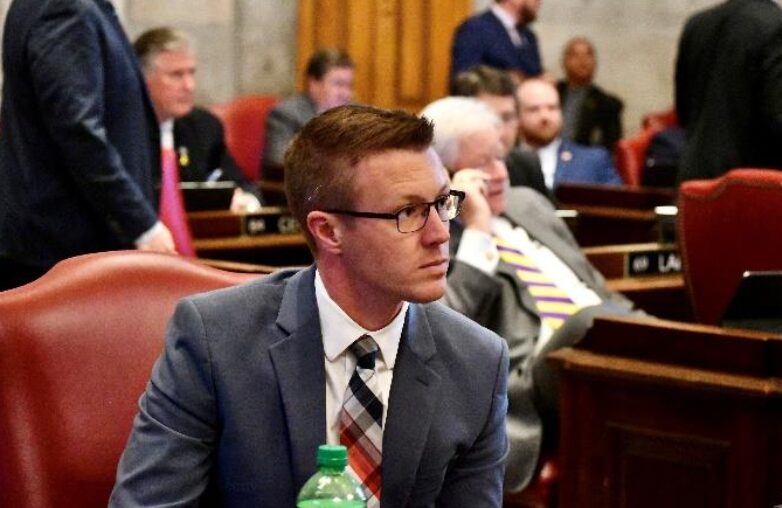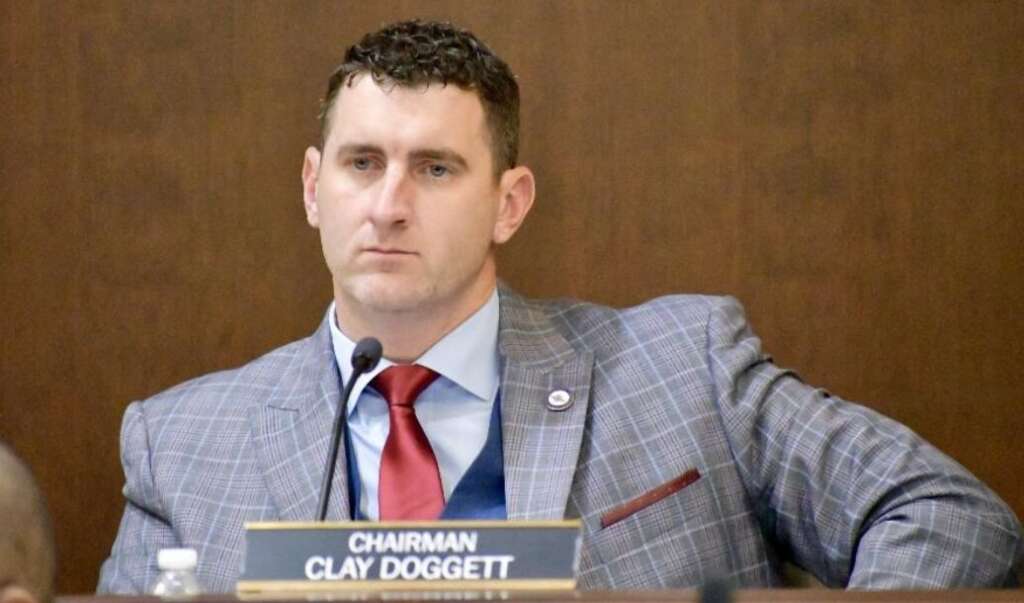Grant program for school emergency alert response systems advances
Legislation that would establish a grant program for safety alert systems in Tennessee public schools advanced out of the Government Operations Committee this week.

House Bill 2528, sponsored by State Rep. Ron Gant, R-Piperton, would provide $60,000 annually to assist local school districts and public charter schools with the installation of rapid response devices. The systems can pinpoint the exact locations of an emergency and directly notify law enforcement in situations such as a medical emergency, unauthorized intruder, or other crisis.
“This is a very important bill that will take a step into the right direction to protect our children at school with all the uncertainty that we face in this world,” Gant said. “Our children are our future and… this bill adds a very important safety measure to protect (them) while at school.”
The Department of Education would be in charge of administering the grant program and funds must be awarded to two schools from each of the state’s three grand divisions.
House Bill 2528 will now go to the Finance, Ways and Means Committee for further consideration.
Cassie Wright Act aims to help support struggling teens
Legislation that ensures parents are able to support their children who may be struggling with their mental health passed both chambers of the General Assembly this week.

The Cassie Wright Act, sponsored by Assistant House Majority Leader Mark Cochran, R-Englewood, was named in honor of a local teen who was seeking mental health care, but tragically took her own life. Due to her age and current Tennessee law, Cassie’s mother was not informed of her struggles.
Currently, if a child is 16 years old or older, they have the same rights as an adult when it comes to outpatient and inpatient mental health treatment, medication decisions, confidential information and participation in conflict resolution procedures.
“No child should ever suffer alone,” Cochran said. “Children need their parents support, especially if they are dealing with mental health crisis. I hope that by passing this legislation, parents are able to be involved in their child’s treatment when necessary and keep tragedies like this from ever happening again.”
This legislation authorizes a child’s parent, legal guardian or legal custodian to have access to the minor’s prescription records in regards to their mental health treatment. It also requires any professional treating a child to report any suicidal ideations or thoughts of self-harm made by the child to the minor’s parent, legal guardian or legal custodian.
House Bill 2773 will now head to Gov. Bill Lee’s desk to be signed into law.
Bill establishes high-demand workforce readiness grant program
The General Assembly is considering legislation aimed at improving workforce readiness in Tennessee for careers in high demand.
House Bill 2178, sponsored by State Rep. Mark White, R-Memphis, would establish a grant program to provide financial assistance to students enrolled in a qualified private, nonprofit technical school or public institution of higher education that offers workforce programs for high-demand, high-wage fields.
“One of the issues that we struggle with a lot of times is a lot of our workforce will go to a community college or a trade school and they just don’t hang in there for a year… or two years,” White said. “To get somebody and give them a credential where they can get out and get a job is highly valuable.”
Earning a credential is much quicker than a degree, often taking between eight to 14 weeks to complete. Students would receive half of their grant after completing 20 percent of a course with the remaining funds being awarded after completion of the program. House Bill 2178 has been placed behind the budget to be considered for funding at a later date.
Promising Futures pilot program bolsters access to child care, literacy
Legislation aimed at increasing child care access and literacy skills in Tennessee advanced out of the Government Operations Committee this week.
House Bill 785, sponsored by State Rep. Mark White, R-Memphis, would create the Promising Futures pilot program to provide last-dollar scholarships for non-school-aged children to attend high-quality early care and learning programs to develop important language and literacy skills.
“The bill will help to tackle two major problems, early childhood literacy combined with child care affordability and availability,” White said. “(It) would encourage more child care programs to use instructional practice that are proven to support early childhood literacy and learning.”
“Without affordable, available child care in our state, it keeps many of our family members out of the workforce,” he added.
The Department of Human Services, in consultation with the Department of Education, would create and implement the four-year pilot program. It would be funded with $5 million each year from privilege tax collections on sports wagering.
Scholarships would be awarded to children who were not yet in kindergarten and whose household income was up to 100 percent of the state median income, which stands at $64,035 as of 2022, according to the U.S. Census Bureau.
House Bill 785 is scheduled to be heard in the Finance, Ways and Means Subcommittee on April 10.
Bill allowing retired law enforcement to serve as SROs advances
Legislation aimed at helping fill school resource officer (SRO) vacancies in Tennessee was approved by the House chamber this week.
House Bill 2682, sponsored by State Rep. Clay Doggett, R-Pulaski, allows retired law enforcement officers to temporarily return to work without losing retirement benefits if certain conditions are met.

“Allowing these retirees to come back into the workforce to fill these voids hopefully will give opportunity for local departments to find qualified officers going forward after this two-year program,” Doggett said.
Law enforcement officers have to be retired for at least 60 days and can be re-employed for up to a year, with extensions possible.
The General Assembly in 2023 allocated $230 million to enhance school safety, including $30 million for a school resource officer in every public school in the state.
The companion version of House Bill 2682 is still advancing through the Senate. If approved, the law would take effect July 1. It would be repealed on June 30, 2026.
General Assembly improves voting accessibility for blind Tennesseans
The General Assembly this week unanimously passed legislation that will improve access to voting for visually impaired Tennesseans.

House Bill 2293, also known as the Print Disability Absentee Voting Act, creates a process for an accessible electronically-delivered ballot to be delivered to voters with print disabilities that affect their ability to read, write and use printed materials.
“Voting shouldn’t be a burden on any citizen with a disability,” said bill sponsor State Rep. Elaine Davis, R-Knoxville. “This legislation preserves election integrity while providing an accessible ballot for blind Tennesseans to securely and privately cast their ballots.”
The legislation requires the coordinator of elections to create an application for print-disabled Tennesseans to request an electronically-delivered ballot. An application link would also be located on the Tennessee Secretary of State’s website for voters to submit requests. The bill does not allow the use of an electronic or digital signature.
House Bill 2293 will now go to Gov. Bill Lee’s desk to be signed into law.
Legislation strengthens punishment for violent youth offenders
The Criminal Justice Subcommittee this week advanced legislation that would prevent teenagers who commit certain violent crimes from purchasing or possessing a firearm in Tennessee until they turn 25.
House Bill 1600, sponsored by State Rep. Ryan Williams, R-Clarksville, would apply to any juvenile 14 years of age or older who was adjudicated delinquent by a court for committing one of more than a dozen violent offenses listed in the legislation.
“(This) would not take away anyone’s Second Amendment right,” Williams told members of the subcommittee Wednesday. “But, it would allow them to delay that for a short period of time until after the juvenile has been released from the penalty of their juvenile crimes.”
Williams said age 25 is appropriate because brain development is not complete until that time, according to professional medical associations, including the National Institute of Health.
The legislation would apply to those minors whose conduct, if tried as an adult, would be classified as aggravated assault, aggravated assault against a first responder or nurse, criminal homicide, robbery, aggravated robbery, especially aggravated robbery, carjacking, burglary, aggravated burglary, especially aggravated burglary, aggravated cruelty to animals, a threat of mass violence, or any other criminal offense that involves the use or display of a firearm.
If approved, the new law would apply to crimes committed after July 1. Violations would result in a Class A misdemeanor.
House Bill 1600 is scheduled to be heard in the Criminal Justice Committee on April 9.
Republicans advance domestic violence offender registry
Legislation establishing a statewide registry for domestic violence offenders advanced out of the Criminal Justice Committee this week.
House Bill 2898, also known as Savanna’s Law, would create a publicly accessible database of repeat domestic violence offenders in Tennessee.

The legislation is named in honor of Savanna Puckett, a Springfield native who was murdered by her ex-boyfriend in 2022.
“As it turns out, this man had a previous record…,” said bill sponsor State Rep. Sabi Kumar, R-Springfield. “Savanna’s mother believes if there had been a domestic violence registry, this tragedy could have been prevented.”
According to the legislation, an offender with one prior conviction would be listed on the registry for two years. Individuals with two prior convictions would be placed on the list for five years, while those with three or more prior convictions would be listed on the registry for ten years.
House Bill 2898 is scheduled to be heard in the Finance, Ways and Means Subcommittee on April 10.
Republicans strengthen protections against fentanyl
The Criminal Justice Subcommittee this week advanced legislation enhancing the penalty for certain drug offenses in Tennessee.
House Bill 1947, sponsored by State Rep. Dan Howell, R-Cleveland, expands the offense of aggravated assault against first responders to include exposing them to fentanyl. It also creates trafficking penalties for distributing fentanyl across county lines and seeks to increase the discretion of how district attorneys prosecute under drug and murder statutes.

The legislation was prompted by a case involving two sheriff’s deputies who went into cardiac arrest and almost died after being exposed to fentanyl while apprehending a suspect, Howell said.
House Bill 2301, also sponsored by Howell, would strengthen existing state law that allows alleged drug dealers to be charged with second-degree murder if a fentanyl overdose death occurs.
House Bill 1947 is scheduled to be heard in the Criminal Justice Committee on April 1. House Bill 2301 is scheduled to be heard in the Finance, Ways and Means Subcommittee on April 10.
General Assembly allows caregivers to administer certain medications
The General Assembly this week approved legislation allowing trained personal support service agency (PSSA) employees to give patients medications in certain situations.
House Bill 2081, sponsored by State Rep. Rebecca Alexander, R-Jonesborough, removes a current restriction in state law that prohibits unlicensed caregivers who are employed by a PSSA from administering medications. PSSAs typically provide various services like cooking, cleaning and assistance with bathing.
The legislation will allow these caregivers to administer oral and topical medications after they complete a competency-based training program approved by the Department of Mental Health and Substance Abuse Services. However, they will still not be allowed to administer any type of intravenous, intramuscular and certain injectable medications.
The Department of Intellectual and Developmental Disabilities will work with the Board of Nursing to ensure rules are known, coordinate and provide training, as well as monitor the caregivers covered under this legislation. House Bill 2081 will now head to Gov. Bill Lee’s desk to be signed into law.
Tennessee Foster and Adoptive Parent Protection Act approved
The General Assembly approved legislation this week that protects foster parents’ religious and moral beliefs while ensuring the best interest of the child.
House Bill 2169, also known as the Tennessee Foster and Adoptive Parent Protection Act, ensures current or prospective adoptive or foster parents in Tennessee will not be required by the Department of Children’s Services (DCS) to support any government policy regarding sexual orientation or gender identity that conflicts with their religious or moral beliefs. The legislation also prevents DCS from denying a parent’s eligibility to foster or adopt a child based on those beliefs.
“Tennessee should welcome a diverse range of qualified adoptive and foster parents, including people of faiths and beliefs, and this bill will enforce this idea,” said bill sponsor State Rep. Mary Littleton, R-Dickson. “It is important to always consider the best interest of the child.”
The religious or moral beliefs of a foster child or their biological family may also be considered by DCS when determining the most appropriate placement for the child.
House Bill 2169 will now head to Gov. Bill Lee’s desk to be signed into law.
Bill expanding nursing workforce advances
Legislation aimed at increasing the number of psychiatric nurses at Tennessee’s regional mental health institutes advanced out of the Health Committee this week.
House Bill 2866, sponsored by State Rep. Charlie Baum, R-Murfreesboro, would create a three-year pilot program that would provide up to five students from Middle Tennessee State University (MTSU) with a $3,000 scholarship in exchange for working at the mental health institutes for at least two years upon graduating. The students would learn and train at the facilities as well.
The legislation would also provide loan forgiveness for up to 15 students who complete their two years of service at the mental health institutes along with the licensing requirements to become a clinical nurse specialist in psychiatric or mental health with a master’s degree.
House Bill 2866 now heads to the Finance, Ways, and Means Committee for further consideration.
Briefly…
Government transparency: The General Assembly this week unanimously passed legislation increasing transparency of state government meetings in Tennessee. House Bill 2934, sponsored by State Rep. Rush Bricken, R-Tullahoma, requires state boards, state commissions and state councils to make agendas available to the public at least 48 hours prior to a regular meeting. The agenda must “reasonably describe the matters to be deliberated or acted upon” during the meeting, according to the legislation. City and county legislative bodies are already required to do so. House Bill 2934 will now head to Gov. Bill Lee’s desk to be signed into law.
Second Amendment Financial Privacy Act: The House chamber this week passed legislation protecting the financial transaction data associated with legal firearm and ammunition purchases in Tennessee. House Bill 2762, also known as the Second Amendment Financial Privacy Act, prohibits a government entity from knowingly keeping a list, record or register of privately-owned firearms or their owners. The legislation, sponsored by State Rep. Rusty Grills, R-Newbern, also prohibits financial institutions like banks and credit card companies from requiring the use of a specific merchant category code (MCC) to identify transactions that occur at firearms retailers in the state. The bill would prevent legal purchases at the retailers from being denied based solely on the code as well as protect financial records of the transactions from disclosure unless required by law. Alleged violations of the law would be investigated by the Attorney General’s Office and could result in a civil penalty of up to $10,000 if necessary. If the Attorney General declines to investigate a case, a firearms retailer or customer could pursue an injunction in chancery court where the alleged violation occurred.
Illegal immigration: House committees this week advanced two pieces of legislation aimed at further combating illegal immigration in Tennessee. House Bill 1128, sponsored by State Rep. Ron Gant, R-Piperton, requires jails and arresting law enforcement agencies to collaborate to verify the citizenship status of a person arrested, booked or confined for any period of time. If a suspect is found to be in the country illegally, the district attorney is to notify the appropriate immigration and customs enforcement detention and removal operations field office. House Bill 1128 is scheduled to be heard in the Criminal Justice Committee on April 9. Additionally, House Bill 2304, sponsored by State Rep. Monty Fritts, R-Kingston, would require law enforcement agencies in the state to report every month to the Department of Safety information about each interaction it had with illegal aliens. The Department of Safety would also be required to report that information to the Tennessee Bureau of Investigation and the General Assembly. House Bill 2304 is scheduled to be heard on the House floor on April 8.
College athlete compensation: The House Education Administration Committee this week advanced legislation that would provide additional protections for students, coaches and universities related to compensation for intercollegiate athlete’s name, image or likeness (NIL). House Bill 1059, sponsored by State Rep. Kevin Vaughan, R-Collierville, expands the definition of intercollegiate athlete to include current and perspective students, which would allow them to determine the value of their NIL in certain situations. The bill also makes clear that the National Collegiate Athletic Association (NCAA) cannot restrict an athlete’s ability to earn compensation or obtain representation to perform due diligence to determine the value of their NIL. Additionally, the legislation protects schools and their employees from potential litigation from any athlete who feels their market value was negatively affected by a lack of playing time. It also specifies that schools and their employees are not agents and are ineligible to receive compensation. House Bill 1059 will now go to the Calendar and Rules Committee before heading to the House floor for a vote.
Driving under the influence: House Bill 2302, also known as the Ben Kredich Act, establishes that a person can be charged with driving under the influence if they are suspected of impaired driving within 24 hours of being given an opioid overdose reversal drug like Narcan. The legislation, sponsored by State Rep. Dan Howell, R-Cleveland, also allows first-responders who administer Narcan to an individual experiencing an overdose to provide information to them about the risks associated with driving within a 24-hour period. The legislation is named after Ben Kredich, who was struck and killed by an impaired driver while walking near the University of Tennessee’s campus in Knoxville last summer. Prior to the crash, the driver had recently been given Narcan for a suspected drug overdose. House Bill 2302 is scheduled to be heard in the Criminal Justice Committee on April 9.
Protecting law enforcement: The House Criminal Justice Subcommittee this week advanced legislation enhancing the penalty for assaulting police officers in Tennessee. House Bill 1881, sponsored by State Rep. Kip Capley, R-Summertown, would make the offense of assault against a law enforcement officer a Class E felony punishable by a mandatory minimum 60-day sentence and a $10,000 fine. The crime is currently a Class A misdemeanor. There was an average of 440 arrests for simple assault against law enforcement officers during the last five years, according to the Tennessee Bureau of Investigation. House Bill 1881 is scheduled to be heard in the Criminal Justice Committee on April 9.
Juvenile offenders: House Bill 2702, sponsored by State Rep. Mary Littleton, R-Dickson, would require children 14 years old or older to be tried as an adult if they are accused of an stealing a firearm or using a firearm while committing what would be a felony. The legislation is scheduled to be heard in the Criminal Justice Committee on April 9.
United Nations: The House on Monday approved a resolution calling for an American withdrawal from the United Nations (U.N.). House Joint Resolution 849, sponsored by State Rep. Dennis Powers, R-Jacksboro, urges the U.S. Congress and President Joe Biden to withdraw from the U.N. and instead strengthen ties with the North Atlantic Treaty Organization (NATO). The United States in 2022 contributed more than a third of the U.N. system’s revenue from nations across the world. The resolution will now be considered in the Senate.
Alcohol safety: House Bill 1870 requires an applicant for a server permit to be trained in understanding the role of alcohol in sexual assault and harassment along with the best practices for ensuring patron safety, recognizing the role of drugs in assault and strategies to prevent patron drugging in establishments. The legislation also requires the training to educate servers on recognizing and reporting the signs of human trafficking. House Bill 1870 was approved by the General Assembly this week and will now head to Gov. Bill Lee’s desk to be signed into law. It will take effect Jan. 1.
Workforce licensing: The House chamber this week passed legislation aimed at increasing workforce participation in Tennessee by providing individuals with criminal records a better chance at licensed work. House Bill 1859, sponsored by State Rep. Elaine Davis, R-Knoxville, will update Tennessee’s Fresh Start Act to ensure licensing agencies do not use vague terms like “good moral character” or “character and fitness” in a license application denial. The bill seeks to help individuals with criminal records successfully reapply in the future by giving them more clarity on the reasons for their rejection. The companion version of House Bill 1859 is still advancing through the Senate.
Vaping: Legislation aimed at studying the effects of vaping on young Tennesseans advanced out of the Health Committee this week. House Bill 2433, sponsored by State Rep. Bryan Terry, R-Murfreesboro, directs the Tennessee Advisory Commission on Intergovernmental Relations (TACIR) to identify the prevalence of vaping among individuals under the age of 21, and include things such as health outcomes, enforcement of underage sales and how to address usage on school grounds. The bill is expected to be heard in the Finance, Ways and Means committee on April 10.
School safety: The General Assembly this week approved legislation that will revoke the driving privileges for juveniles found to have made a threat of mass violence on school property or at a school related activity. House Bill 1698, sponsored by State Rep. Robert Stevens, R-Smyrna, adds loss of driving privileges or the ability to obtain a driver’s license for one year to those adjudicated juvenile’s dispositions. The bill will now head to Gov. Bill Lee’s desk to be signed into law. It will take effect July 1.


